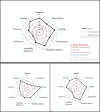PRECIS-2 used as an implementation science tool for global environmental health: A cross-sectional evaluation of the Ecolectivos study protocol to reduce burning of household plastic waste in rural Guatemala
- PMID: 39775435
- PMCID: PMC11684596
- DOI: 10.1371/journal.pone.0316161
PRECIS-2 used as an implementation science tool for global environmental health: A cross-sectional evaluation of the Ecolectivos study protocol to reduce burning of household plastic waste in rural Guatemala
Abstract
Background: Randomized controlled trials (RCTs) that evaluate the efficacy of an intervention remain underutilized in community-based environmental health research. RCTs that use a pragmatic design emphasize the effectiveness of interventions in complex, real world settings. Pragmatic trials may be especially relevant when community-based interventions address social and environmental determinants that threaten health equity. The revised Pragmatic Explanatory Continuum Indicator Summary (PRECIS-2) is a validated tool developed in 2015 by trialists to ensure that clinical trials are designed to fit their intended purpose, with an assessment of applicability of the trial results to specific contexts. The purpose of this cross-sectional study was to ask Ecolectivos study investigators and external implementation scientists to evaluate the Ecolectivos study protocol using the PRECIS-2 tool prior to the launch of the trial. Ecolectivos is an implementation science study, using a village-level cluster randomized controlled trial design, to assess a behavioral intervention to reduce household plastic waste burning in rural Guatemala.
Methods: We invited 60 researchers to participate in an online survey between February 2022 and January 2023. Respondents were asked to review the Ecolectivos study protocol and provide scores for the nine PRECIS-2 domains (eligibility, recruitment, setting, organization, flexibility-delivery, flexibility-adherence, follow-up, primary outcome, and primary analysis), with short responses explaining their score. The PRECIS-2 tool is used to assess the degree of pragmatism, ranked on a five-point Likert scale from very explanatory (Checkley W, 2022) to very pragmatic (Ashcraft LE, 2024). Descriptive statistics were used to compare responses between Ecolectivos investigators and external evaluators.
Results: Twenty-five respondents provided data. Among the nine domains, four were rated as pragmatic-eligibility, setting, flexibility-delivery, and primary analysis. Four were evaluated to be equally pragmatic as explanatory-recruitment, organization, flexibility-adherence, and primary outcome. One domain was primarily explanatory in nature-follow-up. Only one domain, eligibility, was statistically significantly different between Ecolectivos investigators and external evaluators, demonstrating that the two groups were broadly consistent in their opinions in eight of the nine study domains. Using the PRECIS-2 tool, we found that our study protocol was viewed as more pragmatic than explanatory, providing evidence to support the pragmatic approach of the Ecolectivos study goals, which is to reduce burning of plastic waste and plastic use in community settings using a behavioral intervention.
Conclusions: By evaluating the degree of pragmatism within the nine domains, PRECIS-2 guides investigators to think about the applicability of potential results. Investigator assessment and communication regarding intervention protocols for community-level environmental interventions, their degree of pragmatism, and external validity are important for identifying strategies to address complex community problems. Our findings contribute to the growing body of literature that addresses greater research utility through pragmatic trial design, tying community environmental health interventions to the rigor of implementation science strategies.
Copyright: © 2024 Thompson et al. This is an open access article distributed under the terms of the Creative Commons Attribution License, which permits unrestricted use, distribution, and reproduction in any medium, provided the original author and source are credited.
Conflict of interest statement
The authors declare that they have no competing interests.
Figures
Similar articles
-
Behavioral interventions to reduce risk for sexual transmission of HIV among men who have sex with men.Cochrane Database Syst Rev. 2008 Jul 16;(3):CD001230. doi: 10.1002/14651858.CD001230.pub2. Cochrane Database Syst Rev. 2008. PMID: 18646068
-
Comparison of self-administered survey questionnaire responses collected using mobile apps versus other methods.Cochrane Database Syst Rev. 2015 Jul 27;2015(7):MR000042. doi: 10.1002/14651858.MR000042.pub2. Cochrane Database Syst Rev. 2015. PMID: 26212714 Free PMC article.
-
Use of the pragmatic-explanatory continuum indicator summary tool in low- and middle-income country settings: systematic review.J Clin Epidemiol. 2025 Jul;183:111800. doi: 10.1016/j.jclinepi.2025.111800. Epub 2025 Apr 22. J Clin Epidemiol. 2025. PMID: 40274241
-
Individual-level interventions to reduce personal exposure to outdoor air pollution and their effects on people with long-term respiratory conditions.Cochrane Database Syst Rev. 2021 Aug 9;8(8):CD013441. doi: 10.1002/14651858.CD013441.pub2. Cochrane Database Syst Rev. 2021. PMID: 34368949 Free PMC article.
-
Eliciting adverse effects data from participants in clinical trials.Cochrane Database Syst Rev. 2018 Jan 16;1(1):MR000039. doi: 10.1002/14651858.MR000039.pub2. Cochrane Database Syst Rev. 2018. PMID: 29372930 Free PMC article.
References
-
- Checkley W, Hossen S, Rosa G, Thompson LM, McCracken JP, Diaz-Artiga A, et al.. Facing the Realities of Pragmatic Design Choices in Environmental Health Studies: Experiences from the Household Air Pollution Intervention Network Trial. Int J Environ Res Public Health. 2022;19: 3790. doi: 10.3390/ijerph19073790 - DOI - PMC - PubMed
MeSH terms
Substances
Grants and funding
LinkOut - more resources
Full Text Sources
Medical


